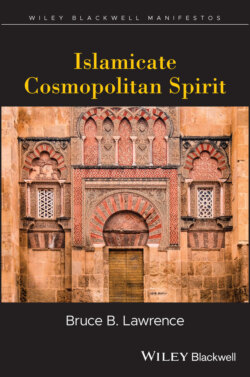Islamicate Cosmopolitan Spirit

Реклама. ООО «ЛитРес», ИНН: 7719571260.
Оглавление
Bruce B. Lawrence. Islamicate Cosmopolitan Spirit
Islamicate Cosmopolitan Spirit
Table of Contents
List of Illustrations
Guide
Pages
Acknowledgments
Preamble
Notes
Overview: A Manifesto in Three Words and Six Chapters
Islamicate Cosmopolitan Spirit
Why Islamicate? Because a New Vocabulary Is Needed
Why Cosmopolitan? Because it Values Bi-location in Two Worlds
Why Civilization? Because Every Cosmopolitan Has Civilizational Roots
Why Spirit? Because Islamicate Cosmopolitan is Fluid and Restless
Islamicate Cosmopolitan Spirit as Fuzzy or Barzakh Logic
Notes
1 Tracing Islamicate Cosmopolitan Spirit Across Time and Space
The Intervention of Huricihan Islamoğlu
Notes
2 Eastward Into India
M. F. Husain
Notes
3 Westward Into Spain
An Excursus on Taskhir and Adab
The Example of Ibn Khaldun
Malek Bennabi—A Marginal Nationalist, an Islamicate Cosmopolitan
Notes
4 Premodern Afro-Eurasia
The Persianate
Decline But Not Defeat of Persianate Accents in Islamicate Civilization
Notes
5 Persianate Culture Across the Indian Ocean
Notes
6 Islamicate Cosmopolitan Spirit Beyond 2020
Journals
Reference Books
Persianate—Within or Beyond Islamicate?
Notes
Conclusion
Notes
Bibliography. I Cosmopolitanism—Theory
II Islamicate Cosmopolitan
Index
WILEY END USER LICENSE AGREEMENT
Отрывок из книги
Bruce B. Lawrence
Duke UniversityDurham, USA
.....
But what is the substantive basis of Islam apart from individual agency? Once we posit that there is no Islam beyond what individual Muslims say it is, then all who claim to speak on behalf of Islam as genuine, observant Muslims are correct, even when they differ. There are no “bad” Muslims and there is no “incorrect” Islam. That reductionism needs to be avoided but it can only be avoided if we use “religious labels” with attention to their historical context. To be Islamic in the 21st century, as in the 11th century, means more than being a believer in Allah, and a follower of Muhammad. But what is the extra element beyond the religious label, however refined and redefined? One has to look at other avenues of meaning, other vistas of hope in the long history of what I prefer to call Islamicate civilization. I argue in this manifesto that one needs to suspend the religious labeling of everyone Muslim, or mislabeling of Muslim as Islamist, in order to find that other sphere of origin and influence. Like Hodgson, I call that larger element “Islamicate” because it draws on Muslim/Islamic antecedents but out of an expansive reservoir of human experience and expression that exceeds religion. It is not secular but centripetal, always attracting a mixture of elements that are both religious and cultural.
Islamicate is at once social and political, aesthetic and literary yet always in flux. According to one of its recent, eloquent definitions, “Islamicate = the hybrid trace rather than pure presence or absence of Islam.”4 Islamicate traces can be antecedent or subsequent,5 before or after “Islam,” but in every instance they exceed objective analysis since they are in-between markers, reflecting gray rather than black and white, ambiguity and flexibility rather than fixity, rigidity, or “objectivity.” As one frequent traveller to many Muslim domains, Asian and African, has noted: “Islamicate = Islam filtered in diverse contexts, reflecting synergy between Muslims and non-Muslims apart from creedal or ritual allegiances.”6 Whether Islam filtered or Islam as hybrid trace, “Islamicate” exceeds binary categories or narrow norms of identity. It inflects fuzzy or barzakh logic, as I will explain below.
.....